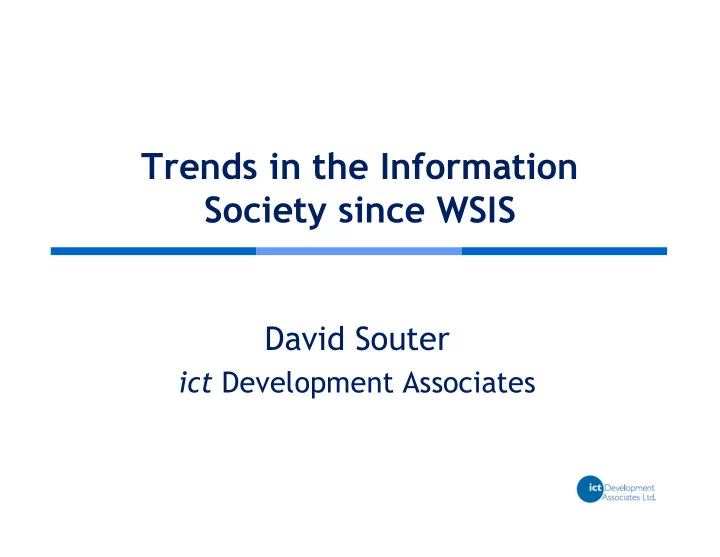

Trends in the Information Society since WSIS David Souter ict Development Associates
The WSIS outcomes
The WSIS outcomes � WSIS targets – 10 targets on The overarching connectivity and other issues WSIS vision of: � WSIS action lines – 18 issues and interactive fora ‘a people- � Monitoring and measurement centred, � Internet governance – IGF and inclusive and enhanced cooperation development- � Financing mechanisms oriented � Follow-up activities through: Information � UN Regional Commissions and agencies Society’ � Multilateral agengies � Private sector businesses � Civil society organisations
Reviewing WSIS after ten years: four questions � To what extent has a 'people-centred, inclusive and development-oriented Information Society’ developed in the ten years since? � How far do you consider the implementation of WSIS outcomes to have been achieved? � What are the challenges to the implementation of WSIS outcomes and to the emergence of a 'people-centred, inclusive and development-oriented Information Society? � What should be the priorities for stakeholders seeking to achieve WSIS outcomes and progress towards the Information Society in the Post-2015 Development Agenda?
Key themes in Information Society development include: � Infrastructure, access and inclusiveness The overarching � Content, applications and capacity- WSIS vision of: building � Technical, financial and related issues � Governance and wider public policy issues ‘a people- � Developmental activities and impacts centred, � New trends in technology and services inclusive and Changes in the Internet and Internet � development- governance � The relationship between the Information oriented Society and the Post-2015 Development Information Agenda Society’ � The processes for WSIS implementation
The context for WSIS implementation 1. The changing international environment: Economic recession and restructuring a. Demographic growth, migration, social and cultural b. change Environmental impacts c. 2. The transition from the Millennium Declaration and MDGs to the Post-2015 Development Agenda and SDGs 3. The rapid pace of change in ICT technology and markets
‘New themes in changing times’ identified in the CSTD 5-year review the transition to mobility in access to 1. basic telecommunications the transition to broadband at the core 2. of network and future service provision the emergence of cloud computing 3. the emergence of value-added mobile 4. services, mobile transactions and mobile Internet the emergence of social networking 5. and other user-generated content and services
‘Emerging trends’ identified in the Issues Paper, CSTD intersessional the datafication of business and 1. government organisation and practice big data analysis and related 2. developments including social media Trends in analytics, open data, crowdsourcing technology and citizen science and markets – the rapid development of cloud 3. the computing and emergence of the development cloud economy of ICTs the development of the Internet of 4. Things the development of smart systems 5.
Reviewing WSIS after ten years: four questions � To what extent has a 'people-centred, inclusive and development-oriented Information Society’ developed in the ten years since? � How far do you consider the implementation of WSIS outcomes to have been achieved? � What are the challenges to the implementation of WSIS outcomes and to the emergence of a 'people-centred, inclusive and development-oriented Information Society? � What should be the priorities for stakeholders seeking to achieve WSIS outcomes and progress towards the Information Society in the Post-2015 Development Agenda?
Regional implementation � The Tunis Agenda (article 101) called on: � regional intergovernmental organisations in collaboration with other stakeholders to: carry out WSIS implementation activities, exchanging information and best practices, at the regional level, as well as facilitating policy debate on the use of ICT for development, with a focus on attaining the internationally agreed development goals and objectives, including the Millennium Development Goals � UN Regional Commissions, when requested by Member States, to: organise regional WSIS follow-up activities, in collaboration with regional and sub- regional organisations, … as well as assisting Member States with technical and relevant information for the development of regional stategies and the implementation of the outcomes of regional conferences � within a multistakeholder approach including private sector, civil society and international organisations.
Regional follow-up � How have stakeholders in the ESCAP region addressed the implementation of WSIS outcomes? � What differences are there between these and other regions – in context, in objectives, in approach, in outcomes? � What lessons can be learnt from the approaches taken in the region, and from different national approaches? � What has been successful, and what has been less than successful? � What are regional priorities for the future, post-2015 development agenda?
Recommend
More recommend